Feeding Dachshund the right diet is essential for their health, joints, and longevity.🐾 A well-balanced diet made for a Dachshund’s unique needs supports their weight, joints, and overall well-being.
Knowing what foods and feeding routines work best can help avoid common problems like obesity and back issues. 🍽️ Not all dog foods are the same. Dachshunds need a mix of proteins, fats, and nutrients that fit their size and activity level. 💪
Paying attention to portions and choosing quality ingredients can make a big difference in your dog’s daily energy and long-term health. 🌿
Key Takeaways ✅
- Proper nutrition and portion control are vital for Dachshund health. 🥦
- Choose ingredients and feeding routines that fit your dog’s needs. 📋
- The right diet helps manage weight and supports lifelong wellness. ❤️
🐾 Free Dachshund Care Guide
Download our free checklist to ensure your Dachshund stays happy, healthy, and well-loved!
Get Your Free Guide 🐶Understanding Dachshund Nutritional Needs
Dachshunds need a diet that matches their energy and nutrient requirements. 🐶 Their body shape and size mean even small nutrition changes can affect their health. ⚖️
Unique Metabolic Traits 🔍
Dachshunds burn energy quickly, so they need more frequent, portion-controlled meals to avoid hunger spikes. 🍽️
Their long backs and short legs put extra pressure on their spine and joints. 🦴 Keeping them at a healthy weight is critical.
Even a little extra weight can stress their back. 🐾 They’re also prone to certain health risks like intervertebral disc disease (IVDD) and obesity.
That’s why steady energy levels and balanced meals are so important. 🍠

🍲 ChefPaw Fresh Food Maker – Homemade Meals Tailored to Your Doxie
Give your Dachshund fresh, nutritious meals every day! ChefPaw makes it simple to cook balanced food at home, without preservatives or guesswork.
- ✅ Supports weight control and ingredient transparency
- ✅ Ideal for dogs with allergies or picky appetites
- ✅ Helps improve digestion and coat health naturally
Key Nutrients for Dachshund Health 🥦
Healthy fats give your dog energy and help keep their skin and coat shiny. Omega-3 and omega-6 fatty acids matter—think fish oil and flaxseed oil. ✨
Protein supports your dachshund’s muscles and keeps them strong. Animal-based proteins like chicken or fish should be a main part of their diet. 💪

Fiber supports digestion. Ingredients like pumpkin or brown rice provide gentle fiber. 🌾
Vitamins and minerals such as calcium, phosphorus, and vitamin D are needed for bone health—especially for dachshunds’ long backs. 🦴
Here’s a table showing key nutrients and their benefits:
| Nutrient | Why It Matters | Key Sources |
|---|---|---|
| Protein | Muscle health | Chicken, Fish |
| Healthy Fats | Coat, energy | Fish oil, Flaxseed |
| Fiber | Digestion | Pumpkin, Rice |
| Calcium | Bone and tooth strength | Dairy, Fish, Greens |
Life Stage Dietary Requirements 📊
A dachshund’s diet should change as they grow. 🐾 Puppies need extra protein and fat to help build muscles and support healthy growth.
Adult dachshunds should have balanced meals that prevent weight gain but provide enough energy for play and daily activity. 🎾
Senior dachshunds often need fewer calories but more joint support. Foods with added glucosamine or chondroitin can help protect their spine and joints. 🛡️
Some older dogs may also need softer foods if chewing becomes difficult. 🍲 Adjust their diet based on their health and weight under your vet’s guidance.
Selecting the Best Diet for Dachshunds
Feeding your Dachshund the right diet helps maintain healthy weight and supports joint health. 🐶
Evaluating Dog Food Types 🍽️
You can choose from several main types of dog food: dry kibble, wet food, freeze-dried, raw, or fresh-cooked meals. 📦 Each has pros and cons.
Dry kibble is easy to store and measure. Many brands offer formulas tailored for small breeds like Dachshunds. 🦴
Some dry foods may use fillers. Wet food is often more appealing to picky eaters, but it can be higher in fat and may need refrigeration after opening. ❄️
Freeze-dried and raw foods offer more natural ingredients but can be expensive. Raw diets need careful handling to prevent bacteria. ⚠️
Fresh-cooked diets are cooked meals made for dogs. They can be delivered or prepared at home. 🍲
These are more time-consuming and tend to cost more, but may offer high-quality ingredients. 🥕
Consider your Dachshund’s health, age, and dental condition when choosing a food type. 🦷 Small or senior Dachshunds may prefer foods that are easier to chew.

🌱 Wild Earth Dog Food – Clean, Protein-Rich & Plant-Based
Powered by plants, this complete and balanced dog food offers all the nutrients your Dachshund needs—with none of the animal by-products.
- ✅ Vet-developed formula rich in clean protein
- ✅ Supports healthy weight and digestion
- ✅ Cruelty-free, allergy-friendly, and eco-conscious
Ingredient Quality and Sourcing 🔍
Look for foods that list a named meat (like chicken or salmon) as the first ingredient. This ensures your dog gets protein from real animals, not byproducts.
Choose foods made without artificial colors, flavors, or preservatives. Whole-food ingredients such as sweet potatoes, brown rice, and carrots add vitamins and fiber. 🌿

Check the origin of your dog food. Brands made in the United States, Canada, or Western Europe often have stricter quality controls. 🌎
Avoid foods with a long list of chemicals or unnamed animal meals. Foods made with organic, non-GMO ingredients and traceable sourcing are best for Dachshund health. ✅
Commercial vs. Homemade Diets 🏠
Commercial diets are balanced to meet basic nutritional standards. 🥣 Top-rated brands for Dachshunds include Royal Canin Dachshund Adult, Hill’s Science Diet, and Blue Buffalo Life Protection.
Preparing homemade meals lets you control each ingredient and avoid allergens. However, creating a diet with the right balance of protein, fat, carbs, vitamins, and minerals can be tricky. 🧪
If you want to make food at home, consult a vet or canine nutritionist. A nutritionist can help build recipes that fit your Dachshund’s age, activity, and health needs. 📋
Homemade diets must add supplements, especially calcium, to provide complete nutrition. 💊 If you feed a homemade diet, check your dog’s weight and health more often to catch nutrient gaps quickly. 📉
Feeding Guidelines and Portion Control

Dachshunds need careful feeding to help them stay at a healthy weight and to avoid back problems. 🐾
How often you feed your dog and portion sizes matter for long-term health and body condition. ⚖️
Recommended Feeding Frequency 🕒
Most adult Dachshunds need to eat twice a day—once in the morning and once in the evening. 🌅
Puppies, which need more energy, should be fed three to four times daily until they are about six months old. 🍼
Senior Dachshunds may also do well with two meals a day, but keep an eye on weight and appetite as they age. 👵
Spreading out meals can help prevent overeating and lower the risk of bloat or weight gain. 🍽️
Some owners prefer to feed one large meal a day, but this isn’t ideal for Dachshunds. Spacing out smaller meals can help support their digestion and energy levels. 🔄
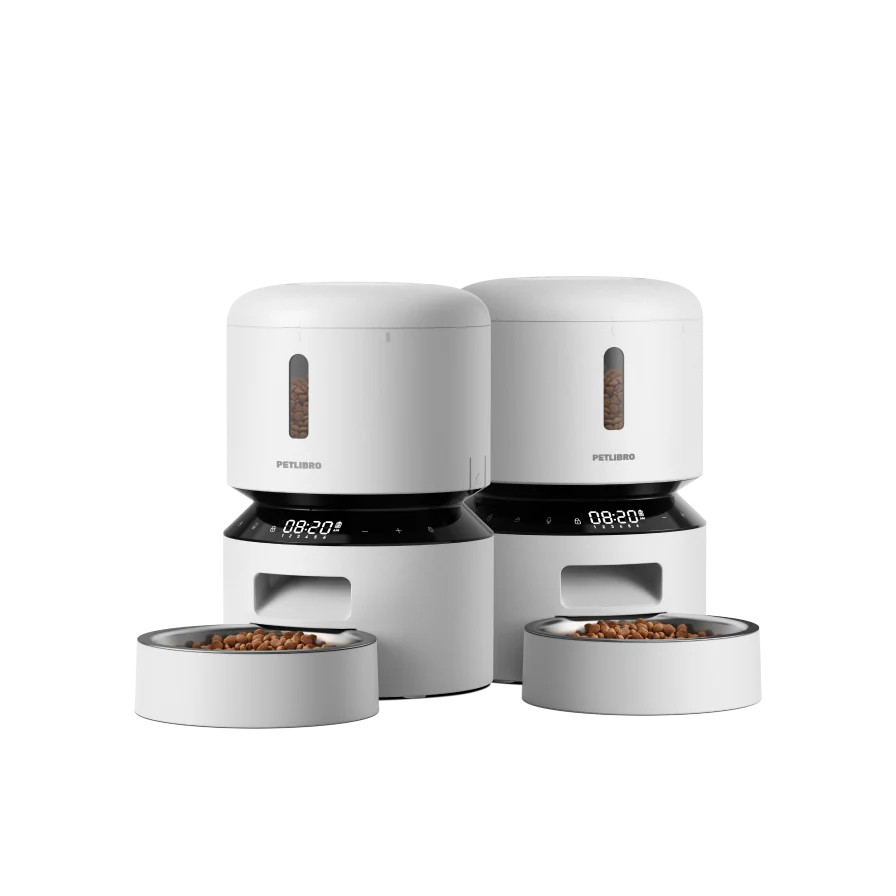
⏲️ Petlibro Smart Feeder
- ✅ Schedule precise meals to avoid overfeeding
- ✅ Great for busy pet parents or travel
- ✅ Helps maintain a feeding routine
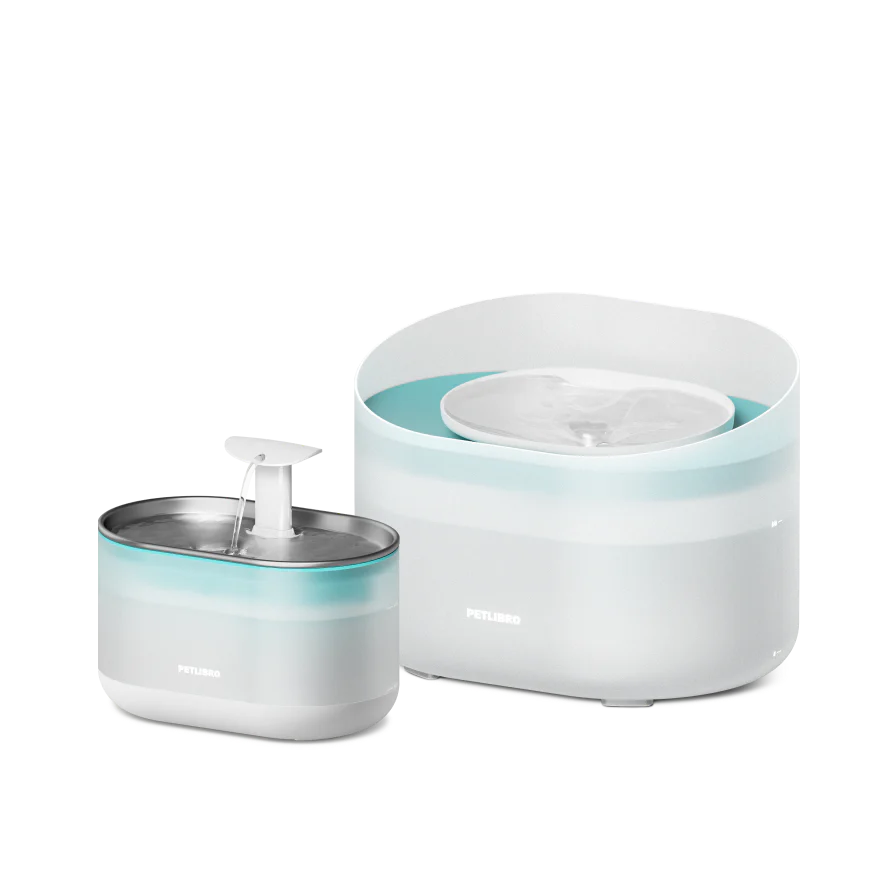
🚰 Petlibro Water Fountain
- ✅ Encourages more hydration with flowing water
- ✅ Filters out debris for clean drinking
- ✅ Quiet motor won’t disturb your pup

🎉 Grab your free Dachshund care checklist!
Calculating Proper Portion Sizes 📏
Portion size depends on your Dachshund’s age, weight, and activity level. 🐕 Check the feeding guide on your dog food bag as a starting point, but remember it’s only a general suggestion. 📦
Use this simple table for a rough estimate:
| Weight (lbs) | Daily Food (cups/day) |
|---|---|
| 8–11 | ¾ – 1 |
| 12–15 | 1 – 1⅓ |
| 16–20 | 1⅓ – 1½ |
Divide the total daily food into the number of meals suggested above. 🕘 Adjust portions if your dog gains or loses weight, gets less active, or changes food types. ⚖️
Always measure food using a standard measuring cup. Avoid “eyeballing” or guessing, as Dachshunds are prone to obesity. 🍽️
Treats should not make up more than 10% of daily calories. 🎁
Dachshund Weight Management Strategies
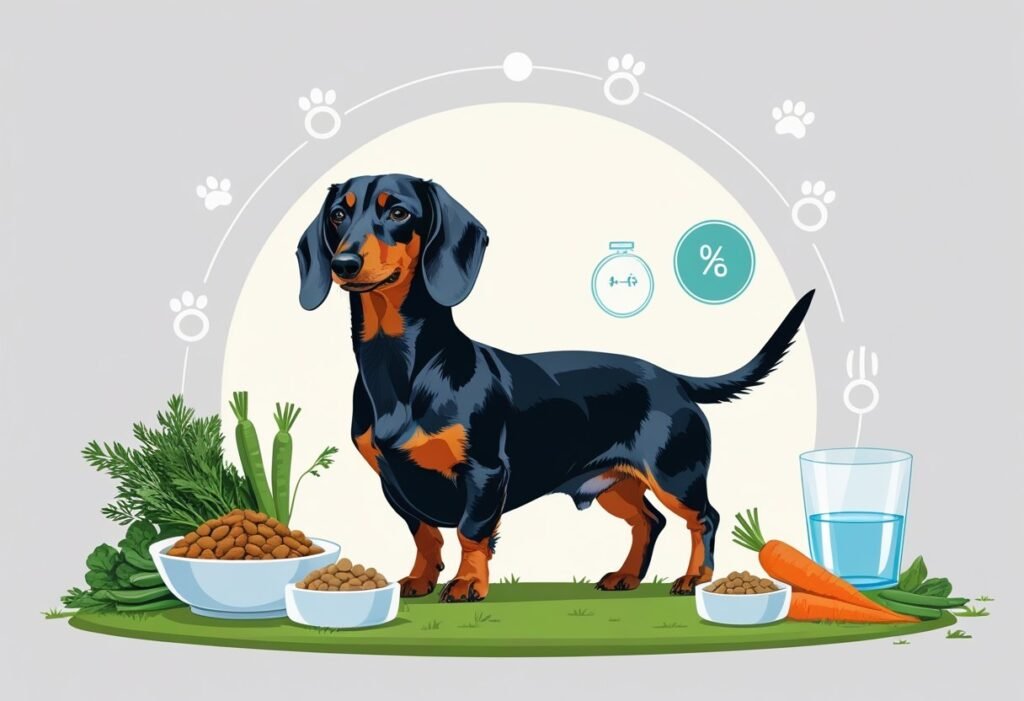
Dachshunds can gain weight easily because of their small size and long backs. 🐾 Keeping your dog at a healthy weight helps prevent joint, back, and heart problems. ❤️
Preventing Obesity ⚖️
Controlling portion sizes is important. Check food labels for calorie content and use a measuring cup for each meal. 🥄
Feed your dachshund high-quality dog food with the right balance of protein, fat, and fiber for small breeds. 🥕 Daily exercise also plays a big part. 🏃
Take your dachshund for at least two short walks a day and encourage playtime with safe toys indoors. 🎾
Avoid giving too many treats. Choose low-calorie treats or fresh, dog-safe vegetables like carrots. 🥬
Watch for weight gain by weighing your dachshund each month. If their ribs are hard to feel, they may be overweight. 📉
Use this quick check to catch small changes early. 🔍

Sample Feeding Schedule 📅
| Meal Time | Type of Food | Amount |
|---|---|---|
| Morning | Dry kibble | 1/4 to 1/2 cup |
| Evening | Wet or dry food | 1/4 to 1/2 cup |
| Treats | Dog-safe veggies | 1–2 tablespoons total |
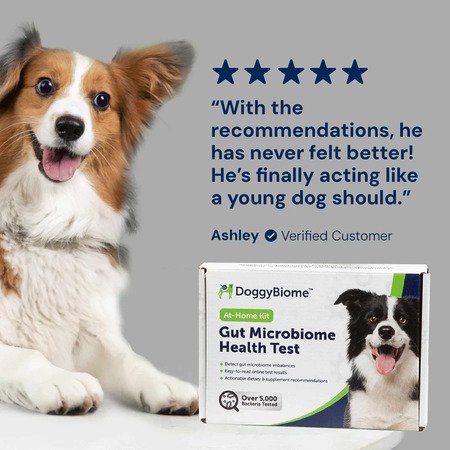
🦠 AnimalBiome Gut Health Kit
- ✅ Analyze your Dachshund’s gut microbiome
- ✅ Personalized diet insights for better digestion
- ✅ Easy-to-use with quick results
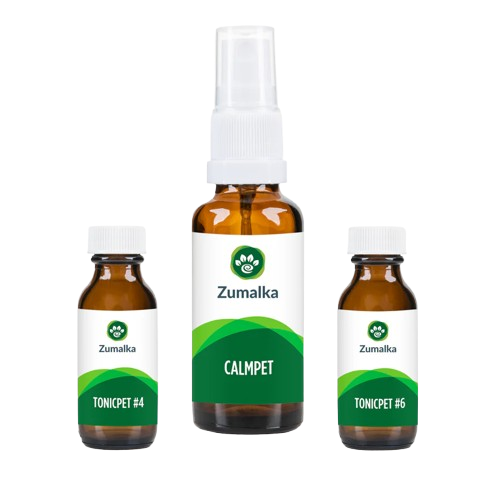
🌿 Zumalka Calmpet Drops
- ✅ Natural homeopathic remedy for stress & anxiety
- ✅ Helps calm grooming-related nervousness
- ✅ Safe, gentle, and non-sedating formula
Healthy Weight Loss Plans 🐾
If your dachshund needs to lose weight, start by adjusting their diet gradually. 🥗 Cut calories by reducing portion sizes and swap high-calorie treats for veggies like green beans. 🌿
Always use a measuring cup to avoid accidental overfeeding. 📏 Increase exercise a little at a time—think extra walks or a few rounds of fetch in the yard. 🐕
Talk to your vet before starting a weight loss plan. 🩺 They’ll help set safe targets and make sure your dog doesn’t lose weight too quickly. 🕊️
Pick foods labeled “weight management” or formulas for small breeds with lower fat and enough protein. Fresh water should always be available. 💧
Track your dachshund’s weight every week to see if your changes are working. 📉 If you don’t see progress after a few weeks, check in with your vet for more ideas. 🔄
Addressing Common Dietary Concerns

Dachshunds can develop allergies to certain foods or become pretty picky eaters. Spotting and handling these issues early helps keep your dog feeling their best. 🌟
Allergies and Food Sensitivities 🌾
Some dachshunds react to common ingredients like chicken, dairy, wheat, or corn. 🐶 You might notice itchy skin, ear infections, stomach upset, or loose stool. 🚫
If you see these signs, ask your vet about an elimination diet. That means feeding a simple meal with one protein and one carb for a few weeks to figure out the trigger. 🥔
Always check ingredient lists, since some allergies show up over time. 🧾 Here’s a quick table on what to watch for:
| Allergy Signs | What to Watch For |
|---|---|
| Skin Problems | Itching, redness, rashes |
| Stomach Issues | Vomiting, diarrhea, gas |
| Ear Infections | Frequent scratching, odor |
Pick “limited ingredient” or “grain-free” foods only if your dog needs them. 🏷️ Introduce new foods slowly—sudden changes can make things worse. ⚠️
📍 Tractive GPS Tracker
- ✅ Track your dog’s location in real time
- ✅ Ideal for curious or escape-prone Dachshunds
- ✅ Health monitoring included

📹 Petcube Cam 360
- ✅ 360° view with 2-way talk and night vision
- ✅ Check in while you’re away at work
- ✅ Calms separation anxiety in dogs
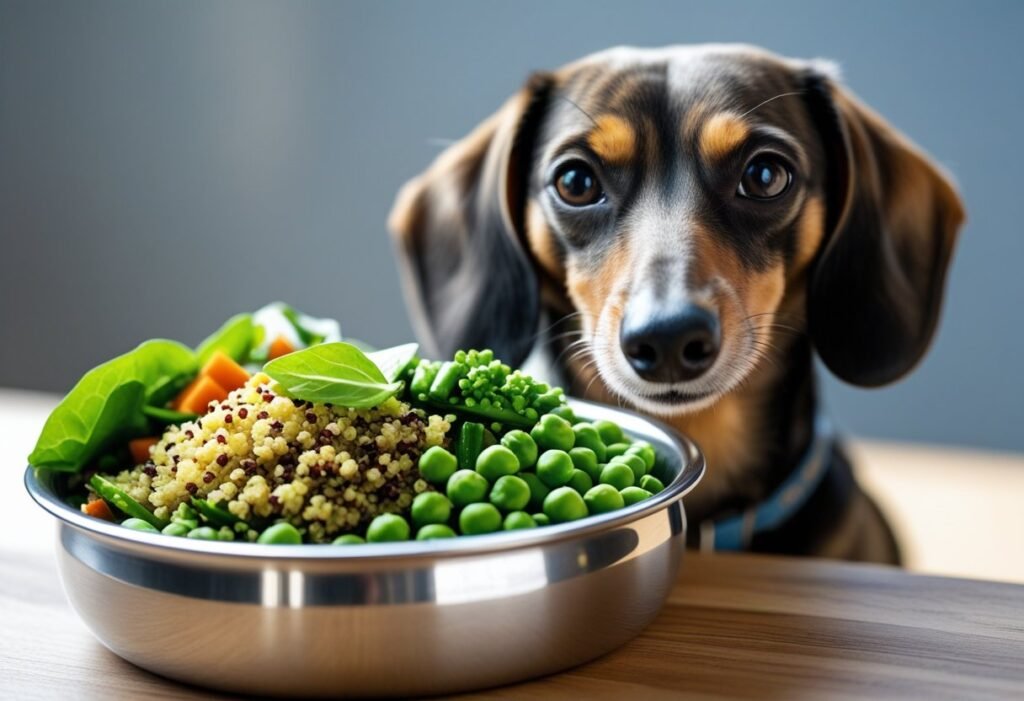
Picky Eating Habits 🍽️
Some dachshunds are just plain picky. 😅 This sometimes leads to skipped meals or missing nutrients. ⚠️
First, rule out health issues with your vet. 🩺 If your dog’s healthy, try making meals more appealing by adding a splash of warm water or low-sodium broth to dry kibble. 💧
Mixing in a spoonful of canned food can tempt them too. 🥄 Here are a few more tips:
- Feed at the same times every day. ⏰
- Keep treats and people food to a minimum. 🚫
- Pick up uneaten food after 20 minutes. 🕒
Don’t switch brands too often. Dogs do best with routine, and too many changes can upset their stomachs. 🌀 Usually, a little consistency and a few tweaks fix picky eating. ✅
Supplements, Treats, and Special Additions

Dachshunds might benefit from the right extras in their diet. 🥬 Picking safe supplements and healthy treats can make a difference. 🎯
Appropriate Supplementation 💊
Your vet might suggest supplements for your dachshund. Popular options include omega-3 fatty acids for skin and coat, and glucosamine for joint support. 🐕
Small breeds like dachshunds often have back and joint issues, so those can help. 🦴 Don’t give human supplements—stick to dog-specific products and check labels for proper dosages. 🧾
Too much calcium or vitamins can actually harm your dog. ⚠️ If your dachshund has a sensitive stomach or allergies, probiotics might help digestion. 🌿
If you feed homemade food, a multivitamin could fill in nutrition gaps. 🥄 Always check with your vet before starting anything new. 🩺

🛏️ Majestic Pet Orthopedic Bed
- Plush orthopedic support for post-groom relaxation
- Soft, machine-washable cover perfect for shedding control
- Creates a warm, cozy nap spot for silky-coated Doxies

🧴 Pride + Groom Grooming Tools Kit
- All-in-one kit for brushing, trimming, and detangling
- Designed to protect and smooth delicate long coats
- Ethical, cruelty-free, and Doxie-approved grooming care
Healthy Treat Choices 🍪
Treats are great for training and bonding, but dachshunds don’t need many extra calories. 🎓 Choose low-calorie treats like tiny bits of cooked chicken, carrot slices, or healthy commercial treats. 🥕
Read treat labels and skip anything with added sugar, artificial colors, or lots of fat. ❌ Natural, simple treats are best when you can get them. ✅
Sometimes, you can use part of your dog’s daily kibble as treats to avoid packing on extra calories. 🍽️ Keep treats under 10% of your dog’s daily intake to help prevent weight gain and keep your pup energetic. ⚡
Supporting Lifelong Dachshund Health Through Diet
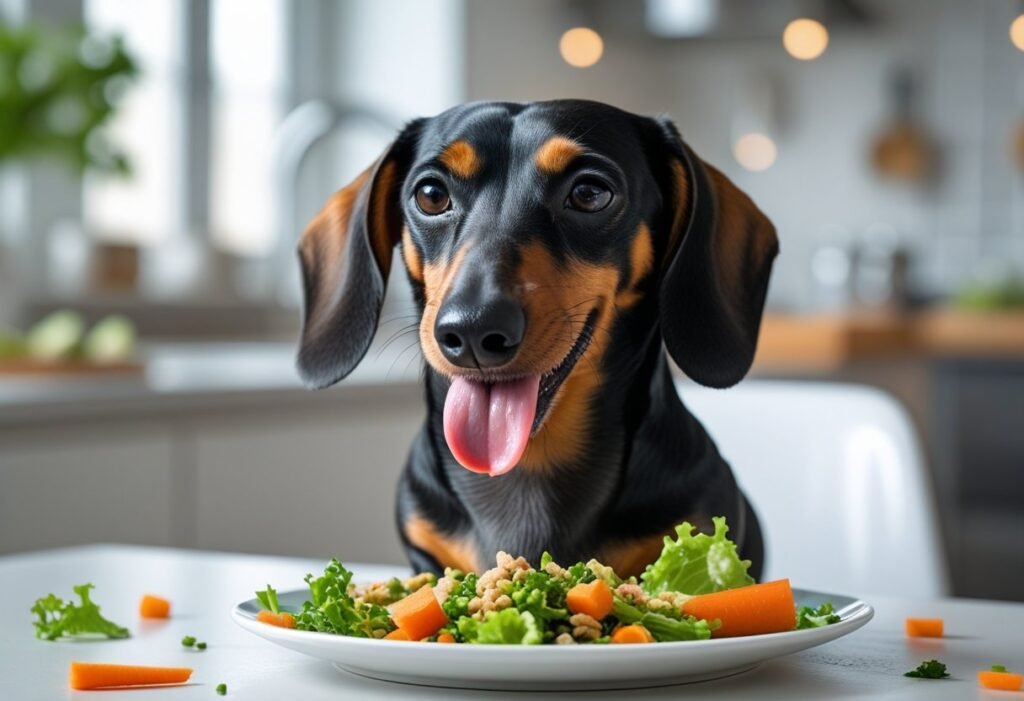
Feeding your dachshund the right foods supports healthy aging and helps manage common health issues like back problems and weight gain. 🧓
Paying attention to nutrition and adjusting your dachshund’s meals as they get older can really boost their health and happiness. 💚
Promoting Longevity With Nutrition 🍽️
Dachshunds need a balanced diet with the right mix of protein, fat, and carbs. ⚖️ Good nutrition keeps their muscles strong, supports joints, and manages weight. 💪
Go for high-quality animal proteins like chicken, turkey, or fish. 🐟 Omega-3 fatty acids from fish oil help lower inflammation and protect joints, which matters since dachshunds often have back issues. 🦴
Make sure your dog gets enough fiber from veggies or grains for healthy digestion. 🌾 Feed a set amount daily using a measuring cup—this helps prevent obesity, which is a big risk for dachshunds. 🥣
Try not to go overboard with treats or fatty “people food.” That can throw off their nutrition and upset their stomach. 🚫
🌟 Daily Care & Enrichment Essentials for a Longer, Happier Life
- 🩺 The Swiftest Pet Insurance — Compare trusted plans and secure your Dachshund’s health for grooming injuries, vet emergencies, or long-term wellness.
- 🧠 Brain Training for Dogs — Fun, science-based games that build obedience, reduce stress, and enhance focus for your clever Doxie.
- 🎒 Embark Pet Adventure Harness — Supportive, comfortable no-pull harness perfect for walks before or after grooming sessions.
- 🪜 Majestic Pet Stairs — Gentle steps for climbing on couches or beds safely, protecting your Dachshund’s back and joints every day.

Monitoring Age-Related Dietary Changes 🧓
Your dachshund’s diet needs shift as they age. 🐶 Puppies need more calories and nutrients for growth, while adults need to maintain a healthy weight and energy. ⚡
Seniors may need food with fewer calories but more joint support. 🦴 Watch for changes like weight gain or loss, energy dips, or digestive problems. 🩺
Here’s a quick reference table:
| Life Stage | Diet Focus |
|---|---|
| Puppy | Higher protein, calories, and calcium |
| Adult | Balanced nutrients, portion control |
| Senior | Fewer calories, more joint support |
If you notice changes, talk to your vet—they can help pick the right food or supplements for your dachshund’s age. 📋 Adjust your plan as needed to keep your dog healthy and active. 🐕
🐾 Don’t Miss Out!
Download our free Dachshund care guide to keep your furry friend happy and healthy.
Get Your Free Guide 🐶Frequently Asked Questions
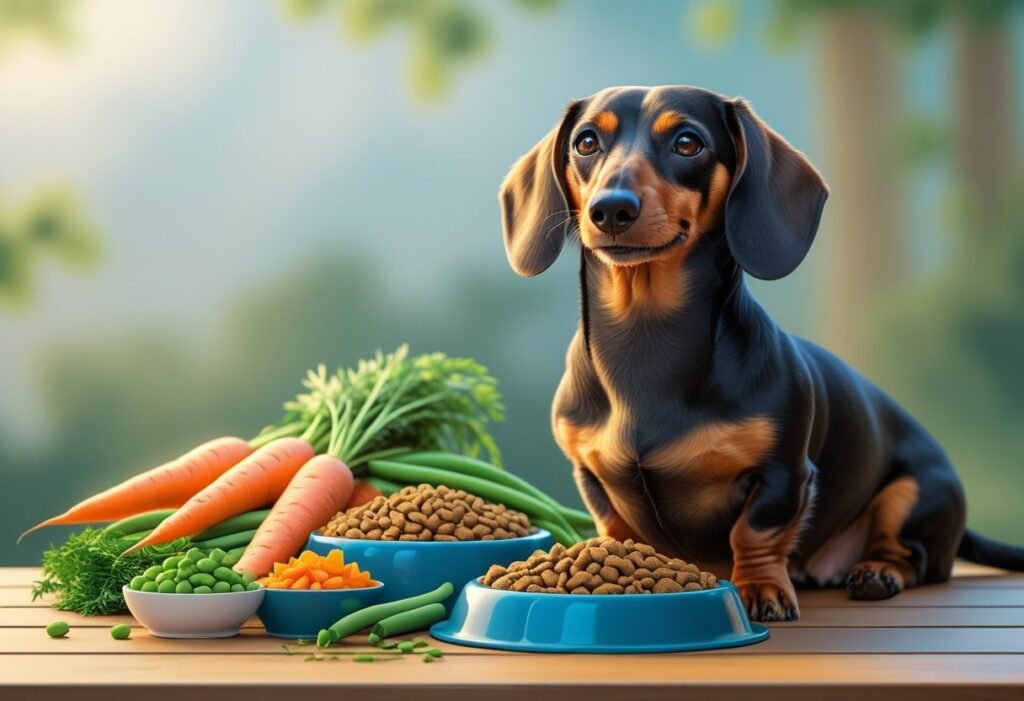
Feeding your dachshund the right amount and type of food helps with muscle tone, healthy weight, and energy. 🍽️ Choosing good ingredients and adjusting portions as your dog ages really makes a difference. 🐾
What is the recommended daily food intake for a Dachshund in grams? ⚖️
An adult dachshund typically eats about 110 to 225 grams of food per day, depending on size, age, and activity. 🐕 Smaller or less active dogs need less, while bigger or more active ones need more. 🏃 Always check with your vet to get the right amount for your dog. 🩺
How can I adjust my Dachshund’s diet as it grows from puppy to adulthood? 📅
Feed your dachshund puppy food split into 3–4 small meals a day. 🍼 Puppy formulas have extra protein, fat, and nutrients for growth. 🧬
At around 10–12 months, start switching to adult food. Cut back to 2 meals a day and adjust portions based on your dog’s weight and activity. 🕒
What are the health benefits of wet versus dry food for a Dachshund? 🥣
Wet food adds moisture, which can help with hydration and is gentler on teeth and gums. 💧 It’s often tastier and easier for picky eaters or dogs with dental issues. 🦷
Dry food helps with dental health and is easier to store and measure. 📦 Some folks mix the two, and that works too. ✅
What is the ideal feeding frequency for Dachshunds to ensure optimal health? ⏰
Most adult dachshunds do best with 2 measured meals a day, about 8–12 hours apart. 🕗 Puppies or very active dogs might do better with 3 smaller meals. 🐾
Keeping a regular schedule helps with digestion and prevents overeating. 🔁
Are there any specific food toppings that can enhance my Dachshund’s diet? 🥕
Plain cooked veggies like carrots or green beans add fiber and vitamins without extra calories. 🌿 Small amounts of lean, cooked meat can boost protein. 🍗
Unsweetened pumpkin helps with digestion. 🎃 Just avoid onions, garlic, grapes, and chocolate—they’re toxic for dogs. 🚫
What nutrients are crucial for a Dachshund’s long-term health and longevity? 🌟
Protein keeps muscles strong. 💪 Healthy fats give energy and help skin and coats look good. ✨
Omega-3 fatty acids can ease joint problems. 🦴 Calcium and phosphorus make bones tougher. 💠 Vitamins A, C, and E boost the immune system. 🛡️ Fiber helps with digestion, which is pretty important for these little guys. 💩
Just double-check that your dog’s food fits their age and needs. Dachshunds deserve the good stuff. 🧡



